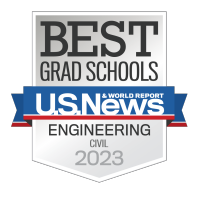CEES Graduate Programs
By almost every possible metric of productivity, CEES is the leading research department in the College of Engineering. CEES has led the College in external research expenditures for the last five years. The faculty in CEES are also involved in several multi-disciplinary research collaborations across campus and with other universities. CEES has been at the forefront in terms of implementing educational innovations and has several ongoing educational research projects. Fellowship and assistantship opportunities are available in addition to financial aid programs to help cover the costs of graduate education.
CEES is the leading research department in the College of Engineering in almost every category of productivity. External research expenditures exceeded $4.00 million last year, which equates to more than $227,000 per faculty member. In CY2013, CEES faculty published 86 refereed journal articles or book chapters. This equates to an average of 4.78 refereed journal publications per faculty member. Also, in CY2013, CEES faculty publications were cited 1600 times in the refereed literature, which equates to an average of 89 citations per faculty member. Almost all of these productivity metrics equal or exceed those of our peer institutions in the Big 12. The elevated number of citations shows the effect of talented young faculty, plus continued productivity of senior faculty.
CEES is one of the few truly multi-disciplinary units on campus. Faculty members within CEES include engineers and scientists. CEES faculty collaborate with researchers across campus and at other institutions. Listed below are the multi-disciplinary research centers and research institutes in which CEES faculty participate. CEES faculty have also developed innovative educational research initiatives such as Sooner City and K-12 educational grants that involve faculty members from the College of Education and Instructional Development. CEES faculty also hold adjunct or co-appointments in Anthropology, Botany & Microbiology, Chemical Engineering, Chemistry, Meteorology and Zoology.
Center for the Restoration of Ecosystems and Watersheds
Drs. Robert Nairn and Robert Knox - Carson Engineering Center
Donald G. Fears Structural Engineering Laboratory
Drs. Royce Floyd, P. Scott Harvey, Jinsong Pei, and Jeffery Volz - Fears Lab
Institute for Applied Surfactant Research
Dr. Brian Grady - Sarkeys Energy Center
Poro Mechanics Institute
Dr. Younane Abousleiman - Sarkeys Energy Center
Remote Sensing Hydrology Group
Dr. Yang Hong - National Weather Center
Southern Plains Transportation Center
Drs. MD Zaman and Jerry Miller
Water Technologies for Emerging Regions (WaTER)
Drs. David Sabatini, Yang Hong, Robert Knox, Randall Kolar, and Robert Nairn - Carson Engineering Center
Oklahoma Water Survey
Drs. Jason Vogel, Keith Strevett - Carson Engineering Center
CEES is one of the leading departments with respect to educational initiatives and different modes of delivering educational material. In addition to the innovations noted earlier, CEES recognizes the need to incorporate "teaching experiences" into Doctoral programs for students considering careers in academia.
CEES also provides research and teaching assistantships, which include stipends, health benefits, and full or partial tuition waivers, to qualified graduate students pursuing MES, MSCE, and Ph.D. degrees. Research assistants typically write their thesis or dissertation on the subject for which financial support is received. Teaching assistants typically supervise laboratory sections, hold office hours, and grade assignments. Master's students receiving financial assistance are almost always those who pursue thesis option degrees. Because students with research and teaching assistantships typically spend 20 or more hours per week on their teaching or research responsibilities, such students may take up to an additional year to complete their master's degree. Students with research and teaching assistantships can enroll for a maximum of 12 credit hours per semester.
Instructor positions are occasionally available for advanced graduate students, particularly those interested in a university teaching career. Graduate students whose native language is not English must first pass an English proficiency exam before being appointed to positions as Instructors or as Teaching Assistants. All applications for financial assistance should be directed to the CEES graduate programs assistant.
Visit the U.S. Bureau of Labor Statistics’ website to explore the median pay for jobs you can pursue with a degree from OU CEES.


